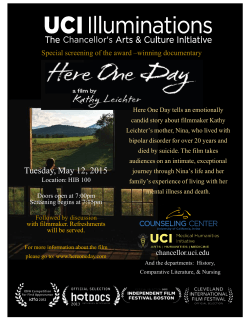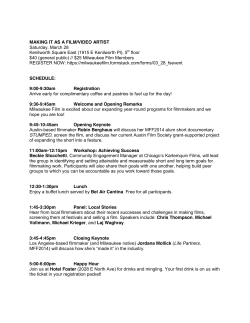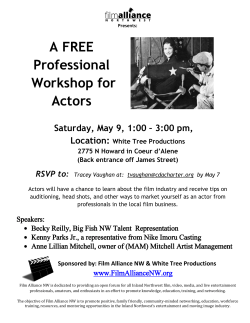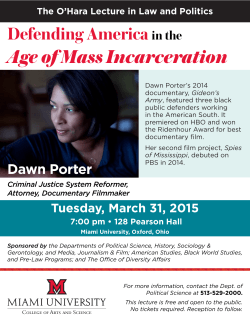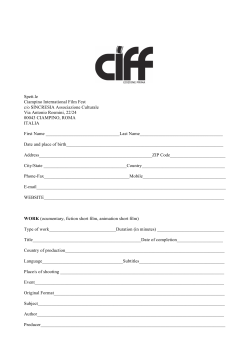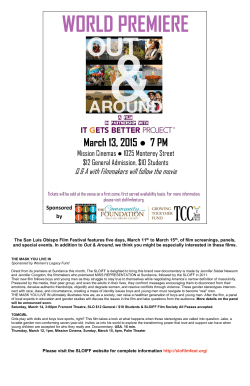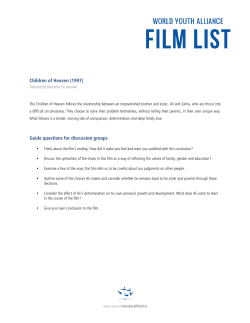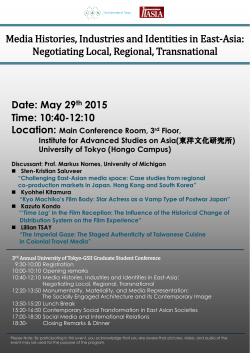
Public Health through Film and Fiction 2013 Course
NYU – Public Health through Film and Fiction, Summer 2013 Course title: Course times: Course Instructor: Amy Hart Public Health through Film & Fiction 3 TR, COURSE: PUHE-GE 2315 (4536) Monday and Wednesday, 6:45pm-8:25pm, May 29 – July 3rd . Location: TBD Amy Hart ah113@nyu.edu c: 518-221-0163. (Off season email: amyhart@me.com www.CenterPeaceFilms.com, FB: amy.hart.5496) Public Health through Film and Fiction 2013 Course Objectives: Students are expected to demonstrate the following competencies by the end of the course: 1. View film and fiction through a public health/population health (PH) lens. 2. Identify a central public health issue, as well as other less prominent PH issues, in a given story and think critically about how the issues are portrayed. 3. Develop insight into how the technique and style of filmmaking influences the emotional response to a story – and to the public health issue addressed. 4. Compare the presentation of a PH topic in a film/novel to relevant research on the topic. 5. Examine the value of personal stories in conveying public health issues. Course Description: Narrative film or fiction has the capacity to raise awareness of a public health issue to a broad, mainstream audience. For example, while countless papers have been written about the horrific conditions of impoverished street children in India, many Americans saw this world for the first time in Danny Boyle’s Academy-Award winning film, Slumdog Millionaire. Whether it was an accurate portrayal or not, it presented images and story lines that mainstream audiences were unaware of prior to seeing the film. In this course we will examine the presentation of public health issues in film and fiction and discuss how public perception may be influenced by stories. How does the story help bring attention to a public health issue? Is it effective? Is it accurate? Is the portrayal of the characters perceived as advocacy or exploitation? Who is the filmmaker and what is their relationship to the issue? What was your perception of the issue before viewing the film? Did your perception change after viewing the film? These are some of the questions to be discussed in Public Health Through Film and Fiction. We will watch films (or clips) through a public health lens and share open discussions after each screening in which students will identify and discuss the PH issues presented in the film and answer a set of questions. Between classes, students will be expected to read articles and explore the background of the topic, the filmmaker and the story before the next class. Students will be expected to participate in class discussions, write a 2-3-page paper each week and participate in discussions online via Blackboard. In addition to viewing the films and participating in class discussions, students will be expected to read one novel entitled Gardens of Water by Alan Drew. A 5-page paper on the book is due during the 4th week of class focusing on one of the PH issues raised in the story. (Topics will be selected.) Students are advised to read the book early in the course. Students will be expected to give a final presentation during the 6th week of class. The final presentation is to be 15-20 minutes long and include 5 key elements. (Specific details below.) For example, a student may illustrate how The Jungle, a 1906 novel by Upton Sinclair, helped to raise awareness of the deplorable working conditions of laborers in meatpacking plants, as well as the health concerns for both the workers and the consumers; another student may interview people of Indian descent about how they feel about the portrayal of life in India in Slumdog Millionaire; or perhaps investigate how African-Americans feel about Precious or The Blindside, or show clips from Stop Loss and share stories of actual vets returning from Iraq or Afghanistan; or use clips from Beasts of the Southern Wild to explore the public health impact of climate change on marginalized communities. Course grade will be based on class participation and group discussions (20%), assigned 2-page papers based on particular elements of the film questionnaire (30%); final individual or small group 1 NYU – Public Health through Film and Fiction, Summer 2013 Amy Hart presentations (30%); and 5-page paper on a public health issue addressed in Gardens of Water (20%). There will be no final examination. Instructor: NYC based photographer/filmmaker, Amy Hart, is the director of CenterPeace Films (www.CenterPeaceFilms.com) and the founding director of Public Health Productions at the New York Academy of Medicine, (http://www.NYAM.org/PHP); she is also an independent documentary filmmaker of Water First: Reaching the Millennium Development Goals (www.WaterFirstFilm.org). Hart was the Producer/Director of Public Health broadcast programs at the University at Albany School of Public Health funded by the NYS DOH and CDC from 2002-2008. In the 90’s, Hart worked at Miramax Films, Fine Line Features, New Line Cinema and as a freelance news writer/producer. Prior to working in film and television she worked in theater as a writer/performer of socially relevant, international theater. Her clients include UNICEF, IOM (Institute of Medicine), Robert Wood Johnson Foundation, GMHC (Gay Men’s Health Crisis), Health and Hospitals Corportation, NY Alliance Against Sexual Assault, Working Mother Media, International Society on Urban Health and many other health-related organizations. Novel: Gardens of Water by Alan Drew, Random House 2008 FILMS to be Screened: Due to time constraints, films will not screened in their entirety. PLEASE WATCH THE FILMS* BEFORE CLASS. (*Films listed first for each week should be viewed ahead of time.) Week 1: POVERTY & STREET CHILDREN Slumdog Millionaire (2008) Directed by Danny Boyle Oliver! (1968) Directed by Carol Reed Salaam Bombay! (1988), Directed by Mira Nair Week 2: HEALTH DISPARITIES/ Poverty & Race Precious: Based on the novel Push by Sapphire (2009) Directed by Lee Daniels The Secret Life of Bees (2008) Directed by Gina Prince-Bythewood Week 3: CLIMATE CHANGE/Public Health Impact on Marginalized Communities Beasts of the Southern Wild. (2012) Directed by Benh Zeitlin When the Levees Broke (2006) Directed by Spike Lee Week 4: FOOD & WATER Food, Inc. (2009) Directed by Robert Kenner Promised Land (2012) Directed by Gus Van Sant Water First (2008) Directed by Amy Hart Gasland and Gasland 2 – Directed by Josh Fox Week 5: MEDICAL ETHICS / Clinical Trials The Constant Gardener (2005) Directed by Fernando Meirelles City of God (2002) Directed by Fernando Meirelles Week 6: Final Presentations: Students, or groups of up to three students, are expected to give an oral presentation on a public health topic addressed in this course. Students are encouraged to think creatively about their presentation. Original video productions may be presented in lieu of an oral presentation. Presentations should integrate the following: One or more film clips or a short passage from a novel that conveys a specific PH topic or concern Brief commentary about the background of the filmmaker/storyteller and his/her relationship to the subject 2 NYU – Public Health through Film and Fiction, Summer 2013 Amy Hart Commentary on public perception of the topic and audience response to the story Relevant academic research on the topic, citing at least one source Exploration of the accuracy of the presentation of the public health topic in comparison to available research Commentary on the value of the story in addressing the PH issue. Introduction to an organization that is actively addressing the issue. Assigned Reading: Note: articles below should serve only as a starting point. Please do your own searches and find articles that are relevant to the given topic. Novel: Gardens of Water by Alan Drew, Random House 2008 Week 1: POVERTY & STREET CHILDREN • Slum Voyeurism? Fareed Sakaria, Newsweek, January 30, 2009 http://www.newsweek.com/id/182341/output/print • Danny Boyle, Tasha Robinson, AVClub, November 26, 2009 http://www.avclub.com/articles/danny-boyle,14337/ • Interview with Mira Nair (excerpt), Bonnie Greer, The Guardian, June, 12, 2002 http://www.guardian.co.uk/film/2002/jun/12/guardianinterviewsatbfisouthbank1 NPR Discussion: http://www.npr.org/templates/story/story.php?storyId=100276269 • Street Children – Community childre, Worldwide Resource Library Pangaea, May 17, 2009 http://www.pangaea.org/street_children/kids.htm • Search for homes for ‘Slumdog’ children picks up Yahoo News, May 26, 2009 • When the Little Ones Run the Show Children’s Parliament Offers Disillunioned Indians a Rare Example of Clean Politics Emily Wax, The Washington Post, May 14, 2009 • Causes and Characteristics of the street child phenomenon: a global perspective Johann L Roux Cheryl Sylvia Smith. Adolescence, Fall 1998 v33 i131 p683(6) HEALTH DISPARITIES / Poverty and Race Week 2: • Pushing Away Interview with Lee Daniels, Director of ”Precious” Jason Guerrasio, Filmmaker magazine, Fall 2009, Page 30-35 • Fade to White Critical essay on the movie “Precious: Based on the Novel ‘Push’ by Sapphire’ Ishmail Reed, The New York Times, Feb 5, 2010; pA25(L). This Honey’s Saccharine Lou Lumenick, The New York Post, October 17, 2008 • 3 NYU – Public Health through Film and Fiction, Summer 2013 Amy Hart • A Golden Dollop of Motherly Comfort A.O. Scott, The New York Times, October 16, 2008 • ‘Precious’ Spawns Racial Debate: She’s ‘Demeaned’ or ‘Angelic’ Felicia R. Lee, The New York Times, November 21, 2009, 159.54866; pC1(L) • Strengthening Communities and The Roles of Individuals in Community Life Robert Aronson, Kay Lovelace, John Hatch, Tony Whitehead Social Injustice and Public Health, Edited by Barry S. Levy, Victor W. Sidel Pages 433-448. • Introduction to Health Disparities Along with other relevant reports by the CDC including: Health Disparities Experienced by Black Children, Youth, and Adults (see packet for details) Centers for Disease Control and Prevention (CDC) • The Poverty Clinic – Can a stressful childhood make you a sick adult? Paul Tough, The New Yorker, March 21, 2011 • Various stats - from Black Health Care www.blackhealthcare.com • Week 3: Epidemiology and Health Statistics of African-Americans Interview with Lee Daniels, Director of ”Precious” Jason Guerrasio, Filmmaker magazine, Fall 2009, Page 30-35 CLIMATE CHANGE – Impact on Marginalized Communities • She’s the Man of this Swamp Review of Besasts of the Southern Wild A O Scott, The New York Times, June 26, 2012 http://movies.nytimes.com/2012/06/27/movies/beasts-of-the-southern-wild-directed-by-benhzeitlin.html • No Love in the Wild bell hooks, new Blackman Bog Spot, September 5, 2012 http://newblackman.blogspot.co.uk/2012/09/bell-hooks-no-love-in-wild.html • One Health: Interdependence of People, Other Species, and the Planet Meredith A. Barrett and Steven A. Osofsky, Chapter published in 2013 *****Please read this chapter! FOOD & WATER Week 4: • Exploring the Corporate Powers Behind the Way We Eat The Making of Food, Inc. Robert Kenner, Food, Inc. Page 27-40 • How the Food Makers Captured Our Brains Tara Parker-Pope, The New York Times, June 23, 2009 4 NYU – Public Health through Film and Fiction, Summer 2013 Amy Hart • The Halliburton Loophole Ediorial, The New York Times • Fracturing Responsibility and Awareness of Chemicals Act Wikipedia – please see references referred to on the site. • Millennium Development Goals: progress towards the health-related MDGs WHO Media Center, Fact sheets, fs290, May 2010 http://www.who.int/mediacentre/factsheets/fs290/en/index.html • Promoting Equitable and Sustainable Human Development Richard Jolly, Social Injustice and Public Health, Edited by Barry S. Levy and Victor Sidel Pages 493-507 MEDICAL ETHICS / Clinical Trials Week 5: • Meirelles on the Constant Gardener Emanuel Levy interview, www.EmmanuelLevy.com, 2005 http://www.emanuellevy.com/search/details.cfm?id=321 • ‘The Constant Gardener’: What the Movie Missed Sonia Shah, The Nation, August 30, 2005 http://www.thenation.com/doc/20050912/shah • Trials by Fire: The Case of Unethical Clinical Trials in the Countries of the South Behzad Hassani, Philosophy and Medicine • African women with HIV coerced into sterilisation David Smith, reporting from Johannesburg, The Guardian, June 22, 2009 • Is Capitalism a Disease? (PLEASE READ THIS CHAPTER.) Richard Levins, Health and Social Justice, Richard Hofrichter, editor; pages 365-384 Week 6: Final Presentations. Additional topics – optional extra study: MILITARISM / Veteran’s Mental Health: Stop Loss (2008) Kimberly Pierce Hurt Locker (2009) Kathryn Bigelow • War and public health: our responsibility to those who serve Linda Degutis, The Nation's Health, August, 2008, v38 i6 p3(1) • Growing Public Health Crisis of Domestic Violence and Suicides by Returning Veterans Elinor Stout, Massachusetts School of Professional Psychology, Reuters, July 21, 2008 • Stop-Loss – An interview with Kimberly Pierce Miles Fielder, The List, April 2008 http://www.list.co.uk/article/7955-stop-loss-an-interview-with-kimberly-peirce/ 5 NYU – Public Health through Film and Fiction, Summer 2013 Amy Hart Film Questionnaire 1. Viewing the film from a public health (PH) perspective: a. What PH issue is most central to the story? b. List other PH topics included. c. Was the central public health topic depicted accurately? Cite at least one source. d. Which character was most affected by the PH issue? Their socio-economic status? 2. Public perception of the PH topic: a. Identify a PH topic in the film and elucidate on the public perception of the topic. b. What is the common public response to this topic? c. Has this film altered public perception? d. Did this film seem to err on the side of advocacy or exploitation? 3. Entertainment and production values of the film: a. What was the tone of the film? b. How did the production (lighting, sound, pace, etc) affect the story? c. Who was/were the central character(s) and how were they portrayed? d. What was at the center of the story other than the PH issue that made it interesting? e. How well did the film balance entertainment and the delivery of a ‘message’? 4. The role of the storyteller/filmmaker: a. Who is the filmmaker/storyteller – what is his/her background? b. What is the filmmaker’s relationship to this particular issue? 5. Your personal response to the film: a. What was your personal awareness of the PH topic before viewing the film? b. How did you feel about the topic after viewing the film? c. What do you think about the topic and the film after doing further research? 6. What is the value of personal stories in conveying public health issues? 6 NYU – Public Health through Film and Fiction, Summer 2013 Amy Hart Style: Title section: Please include your name, date, and a TITLE for your paper – creativity encouraged. Also include standard info: course title, professor, etc. Format: 1.5 spacing; 1.25 inch margins; 11 or 12 pt font. Staple hard copy please. Film titles: Please italicize film titles. Actors’ names may be included, but are not required. Michael Mann’s 1999 film, The Insider, offers a dramatized account of 60 Minutes producer Lowell Bergman’s (Al Pacino) struggle to release an interview with tobacco-industry whistleblower Jeffrey Wigand (Russell Crowe). Works cited: Please use footnotes and include details at the end of your essay or the bottom of the page. If referencing a website, include the date referenced. Footnotes should include: Last name, first name. Date. Title. Publication, page. Duke, Lynne. (2006, August 21). Breach of Faith: Spike Lee Channels a Storm Surge of Anger in ‘When the Levees Broke.’ The Washington Post, p. C01. Submit: Hard copy in class and electronic copy via email: ahart113@nyu.edu SAVE AS: YourName_FilmTitle.doc or PDF. Example: JaneDoe_Beasts.doc – or if your name is really long JDoe_Beasts Rubric for grading papers: NAME: Week # and Film: TITLE of Paper: Score: Addressed specific element of assignment: Included relevant academic research and cited reference(s): Wrote essay in a compelling, literary style: Used proper formatting, footnotes, grammar, punctuation: Completed assigned number of pages: Submitted paper on time: Total: Comments: Possible Points: 40 20 15 10 10 5 100 Given Points: 7
© Copyright 2025
